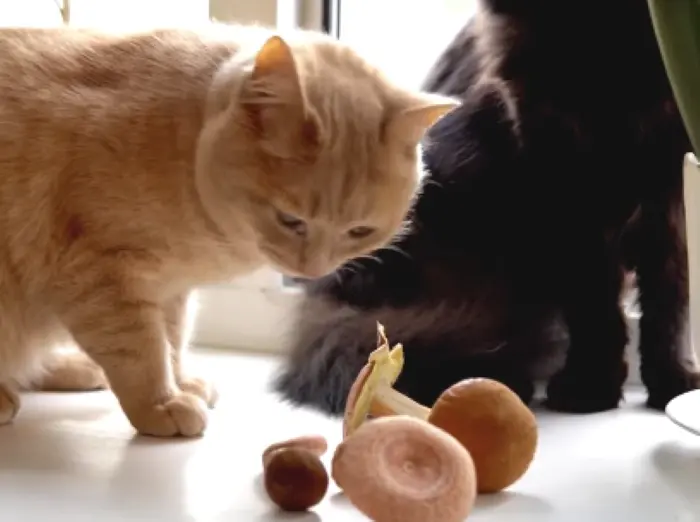Can Cats Eat Mushrooms? Understanding the Safety and Risks
By: Lana Koh

The information in this article is intended to educate cat parents and is not a substitute for veterinary guidance. In case of any concerns about your cat’s health, please talk with your veterinarian.
While some types of mushrooms are safe for cats, it is crucial to be cautious and avoid feeding them any wild or unfamiliar varieties. Cats have unique dietary needs, and not all mushrooms are created equal when it comes to their safety.
When considering mushrooms for a cat’s diet, it is important to understand which kinds may be harmless and which can pose a risk. Familiar grocery store varieties like white button mushrooms are generally safe, but others can lead to serious health issues. Owners should be aware of the potential effects and ensure they are informed about their cat’s nutritional needs.
Owners are encouraged to consult their veterinarian before introducing any new foods to their cats. This approach helps to ensure the pet’s safety and well-being while exploring dietary options.
Key Takeaways:
- Some mushrooms are safe for cats, while others can be toxic.
- Always consult a veterinarian before changing a cat’s diet.
- Understanding the risks helps prevent potential emergencies.
Also Read: Is Beef Liver Good For Cats?
Understanding Feline Nutrition and Mushroom Safety
Cats have specific nutritional needs that play a significant role in their health. Knowing what they can eat and what to avoid is essential for their well-being. This section will discuss vital nutrients for cats, the risks associated with feeding them mushrooms, and the dangers of poisonous varieties.
Also Read: Nutritional benefits of salmon broth for cats
Essential Nutrients for Cats
Cats are obligate carnivores, meaning their diet should primarily consist of animal-based proteins. They require high levels of protein for energy and muscle maintenance. Key nutrients include:
- Taurine: Essential for heart and eye health.
- Amino Acids: Help in tissue repair and metabolic functions.
- Vitamin A: Important for vision and immune function.
- Selenium: Acts as an antioxidant to protect cells.
Risks of Feeding Cats Mushrooms
Feeding cats mushrooms carries certain risks. Store-bought mushrooms like white button and shiitake are generally safe for cats in small amounts. However, caution is advised.
Here are the main risks:
- Digestive Issues: Cats may experience upset stomach, vomiting, or diarrhea from mushrooms.
- Allergic Reactions: Some cats may have adverse reactions, leading to various health issues.
- Nutritional Imbalance: Relying on mushrooms instead of meat can disrupt a cat’s dietary needs.
It’s best to avoid mushrooms unless advised by a veterinarian.
Also Read: Can Cats Eat Tuna?
Poisonous Mushrooms and Mushroom Poisoning
Not all mushrooms are safe for cats. Some varieties are toxic and can cause severe health issues. Toxic mushrooms can lead to mushroom poisoning, which is often serious.
Signs of poisoning include:
- Vomiting
- Diarrhea
- Lethargy
- Seizures
Common poisonous mushrooms include:
- Amanita species: Highly toxic and potentially fatal.
- Galerina marginata: Can cause liver failure.
- Gyromitra species: Associated with neurological symptoms.
If a cat is suspected of eating a toxic mushroom, immediate veterinary care is crucial. Early intervention can improve outcomes significantly.
Types of Mushrooms and Their Effects on Cats
Mushrooms can vary greatly in safety when it comes to cats. Some are safe and can be a part of their diet, while others can pose serious health risks. Knowing the types of mushrooms is essential for pet owners.
Safe Mushrooms for Cats
Common store-bought mushrooms, such as white button, portobello, and shiitake, are generally safe for cats. These mushrooms are often found in grocery stores and are used in many human dishes.
When introducing mushrooms to a cat’s diet, start with small amounts. Cats are obligate carnivores, so they don’t need mushrooms, but a small taste won’t usually harm them. It’s important to ensure the mushrooms are cooked, as raw mushrooms can be harder for cats to digest.
Read: Can Cats Eat Tofu?
Wild Mushrooms and Their Dangers
While many mushrooms have little or no toxicity, some can be highly poisonous and life-threatening to cats. It’s difficult to tell which wild mushrooms are safe without proper knowledge therefore, Wild mushrooms should be avoided entirely. .
Pet owners should take precautions by preventing their cats from roaming in areas with wild mushrooms. Awareness and vigilance can help keep cats safe from these hidden dangers.
Culinary Mushrooms: Portobello and Others
The portobello mushroom is a popular edible choice and is safe for cats when cooked. It has a rich flavor and is often used in various dishes.
Other culinary mushrooms, like shiitake and white button, are also safe options. They contain nutrients without harmful effects when prepared properly.
It’s suggested to avoid seasoning or adding sauces when offering mushrooms to cats. Keeping it simple and plain is best. Store-bought mushrooms present less risk compared to wild varieties, making them a safer choice for curious cats.
Read: Is Pumpkin a good food for Cats?
Incorporating Mushrooms into a Cat’s Diet
Incorporating mushrooms into a cat’s diet requires careful preparation and consideration of what is safe. It’s essential to prepare mushrooms correctly and to be aware of alternative foods that should be avoided.
Preparing Mushrooms for Cats
To prepare mushrooms, start by cleaning them thoroughly. Remove any dirt or debris. Then, cook the mushrooms by steaming or sautéing them without using any oils, seasonings, or additives. It’s advisable to serve them in small amounts to monitor any reactions. Optionally, mushroom broth can be a tasty addition to a cat’s food, enhancing flavor and moisture.
Other Foods and Substances to Avoid
While considering what to feed a cat, several foods should be strictly avoided due to their toxicity. Some of these include:
- Onions and Garlic: Both can cause serious digestive issues and damage red blood cells.
- Caffeine: Found in coffee and tea, caffeine can be toxic to cats, leading to severe health problems.
- Chocolate: Contains theobromine, which is dangerous and can be fatal to cats.
- Grapes and Raisins: Even small amounts can lead to kidney failure in cats.
- Milk and Dairy Products: Many cats are lactose intolerant, leading to stomach upset.
Canned tuna can be tempting for cats but should be given in moderation due to high mercury content. Always consult a veterinarian when introducing new foods into a cat’s diet.
Emergency Care and Prevention
Acting quickly is vital if a cat consumes mushrooms. Recognizing the signs of mushroom poisoning can save a cat’s life. Moreover, taking preventive steps can help avoid accidental ingestion.
Recognizing and Responding to Mushroom Poisoning
Mushroom poisoning can be serious. Owners should look for symptoms such as vomiting, diarrhea, and lethargy. Other signs may include drooling, seizures, or jaundice.
If a cat shows these symptoms, immediate action is necessary. First, contact a veterinarian or an emergency animal clinic. Providing information about the type of mushroom consumed, if known, can help.
While waiting for help, keep the cat calm and monitor their symptoms. Avoid giving any home remedies, as they might worsen the situation. The vet may need to perform tests or administer activated charcoal to limit toxin absorption.
Interesting Read: Why does my cat’s breath smells like fish?
Preventive Measures for Cat Owners
Preventing mushroom poisoning starts with awareness. Cat owners should regularly check their yard or garden for wild mushrooms. If mushrooms are found, safely remove them to eliminate the risk.
Additionally, educate family members about the dangers of mushrooms. It is crucial to discourage cats from roaming freely in areas where wild mushrooms grow.
When walking cats on leashes, keep them away from areas with mushrooms. Owners should also monitor indoor plants, as some houseplants can be toxic. Knowing which plants are safe can further protect cats from accidental poisoning.
Click To Read: Can Cats Eat Tortillas?
Frequently Asked Questions
Many cat owners wonder about the safety of feeding mushrooms to their pets. The following questions address common concerns regarding store-bought mushrooms, cooking methods, and potential toxicity.
Conclusion
While some store-bought mushrooms like white button or shiitake are safe for cats in small amounts, wild mushrooms can be deadly. Always consult a vet before introducing new foods, and prioritize your cat’s carnivorous diet for optimal health. Vigilance and knowledge are key to preventing accidental poisoning.
If your cat ingests unknown mushrooms, seek emergency vet care immediately. Prevention is easier than treatment—keep wild mushrooms out of reach and stick to vet-approved treats. A cautious approach ensures your feline friend stays happy and healthy.

About the Author
Lana Koh
Lana is a passionate cat lover with years of experience caring for her feline companions. As a dedicated volunteer at animal shelters, she’s gained valuable insights into the world of cats. Lana channels her love and knowledge into writing informative and engaging articles for fellow pet owners, covering topics like cat health, nutrition, grooming, behavior, and the special bond we share with our feline friends.
